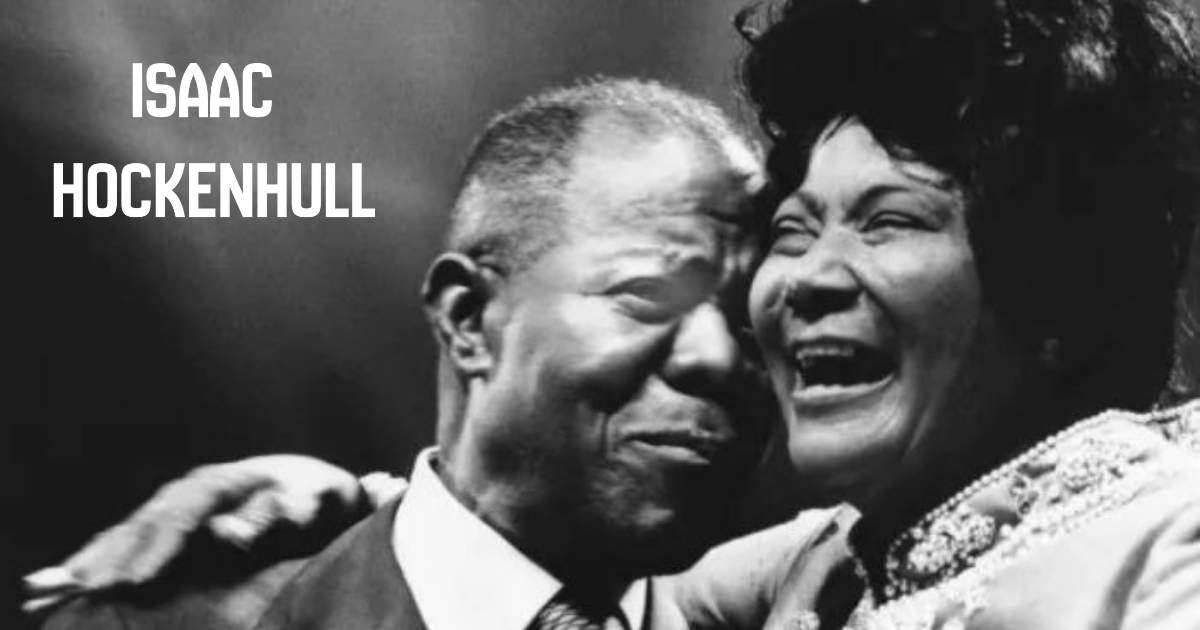When you think of Mahalia Jackson, the Queen of Gospel, visions of her powerful voice and spiritual devotion flood your mind. But behind her rise to glory stood Isaac Hockenhull—a man whose story often gets lost in her shadow. Isaac Lane Gray Hockenhull wasn’t just Mahalia Jackson’s husband.
He was an educated, ambitious man whose dreams collided with reality in ways that shaped both their lives forever. This is his story.
Quick Facts about Isaac Hockenhull
Before we dive deep, here’s what you need to know about Isaac Hockenhull:
| Fact | Detail |
| Full Name | Isaac Lane Gray Hockenhull |
| Birthplace | Mississippi (exact location debated) |
| Education | Fisk University graduate with chemistry degree |
| Marriage to Mahalia | 1936-1941 |
| Profession | Chemist and postman |
| Notable Trait | Sophisticated, college-educated during segregation |
| Death | 1973 |
| Legacy | Mahalia Jackson’s first husband and complex figure |
Isaac Hockenhull represents something fascinating. An African American chemist during the Great Depression era who married gospel’s brightest star. Their union reveals much about 20th-century African American life.
Early Life and Family
Isaac Hockenhull’s early life began in Mississippi, though exact details remain frustratingly scarce. As a Mississippi native, he experienced the brutal realities of Southern segregation firsthand. Jim Crow laws dictated every aspect of existence. Black families faced constant threats and limited opportunities.
His family eventually migrated north—a common story during the Great Migration. They sought better prospects in cities like Chicago. This move shaped Isaac profoundly. He witnessed two worlds: the oppressive South and the slightly more open North.
Growing up, Isaac showed intellectual promise early. His family valued education highly, unusual for that era. Most Black children worked fields or factories. But Isaac’s parents envisioned something different. They pushed him toward books and learning.
The Hockenhull family background emphasized respectability and advancement. They belonged to the Black middle class—small but determined. This upbringing gave Isaac confidence and ambition. It also created expectations he’d struggle to meet.
Isaac Hockenhull Education and Ambition
Here’s where Isaac Hockenhull truly distinguished himself. He attended Fisk University, one of the premier historically Black institutions. Founded after the Civil War, Fisk produced Black intellectuals and professionals. W.E.B. Du Bois walked those same halls.
Isaac Hockenhull’s education focused on chemistry—a demanding field. Few African Americans studied sciences then. Racial barriers blocked laboratory access and job opportunities. Yet Isaac persisted, earning his degree with distinction.
Some sources suggest he also attended Tuskegee Institute, Booker T. Washington’s famous school. Whether he transferred or pursued additional training remains unclear. Both institutions shaped his worldview profoundly.
His ambitions stretched far beyond typical expectations. Isaac envisioned himself as a respected scientist. He dreamed of research positions and professional recognition. These weren’t idle fantasies—they reflected genuine capability.
But reality proved cruelly different. Being an African American chemist in the 1930s meant facing closed doors everywhere. Companies wouldn’t hire Black scientists. Universities denied positions systematically. Isaac’s impressive credentials meant little against racism’s wall.
This gap between education and opportunity would haunt him forever.
Early Marriage Before Mahalia
Most people don’t know Isaac Hockenhull was previously married. Before gospel singer Mahalia Jackson entered his life, he’d already experienced matrimony’s challenges.
Details about his first wife remain scarce. Historical records from that era often overlooked Black marriages. We know the union ended, likely in divorce. This carried significant stigma in African American communities then.
Churches frowned upon divorce heavily. Families whispered disapprovingly. For an educated, respectable man like Isaac, this failure stung deeply. It shaped his approach to his second chance at marriage.
What ended that first relationship? We can only speculate. Perhaps the same tensions that would plague his marriage to Mahalia already existed. Financial stress, unmet ambitions, incompatible visions—these factors destroy marriages across generations.
This background matters when understanding Isaac Hockenhull’s marriage to Mahalia. He brought baggage, experience, and perhaps determination to make this one work differently.
Isaac Hockenhull Marriage to Mahalia Jackson
In 1936, Isaac Hockenhull and Mahalia Jackson married. She was twenty-five, already establishing herself in Chicago’s gospel scene. He was older, educated, sophisticated. The attraction made sense initially.
Mahalia Jackson’s husband represented something she’d never known. Isaac spoke eloquently, understood classical music, moved in educated circles. He seemed worldly compared to her humble New Orleans roots. She’d grown up poor, scrubbing floors and singing in small churches.
Their courtship happened quickly. Isaac pursued her ardently. He attended her performances, complimented her powerful voice, and offered guidance. Mahalia, still finding her footing in Chicago, welcomed his attention.
The wedding symbolized hope for both. Mahalia gained a partner who understood her ambitions. Isaac married a talented woman whose star was rising. They shared dreams of success and stability.
But differences emerged immediately. Isaac’s sophistication clashed with Mahalia’s spirituality. He enjoyed secular pleasures—music, entertainment, socializing. She devoted herself entirely to gospel and church. He drank occasionally; she abstained completely. He gambled; she prayed.
Their backgrounds told different stories. Isaac came from relative privilege and education. Mahalia Jackson’s personal life had been marked by poverty and struggle. These gaps would widen into chasms.
Struggles and Disagreements
The central conflict of Mahalia Jackson’s marriage revolved around her career direction. Isaac saw her extraordinary talent and envisioned wealth. But his vision required compromise she wouldn’t make.
He pushed her toward secular music relentlessly. Jazz clubs offered good money. Popular songs reached wider audiences. Isaac argued she could sing gospel on Sundays and make real money weekdays. To him, this made perfect financial sense.
Mahalia refused absolutely. Her faith wasn’t negotiable. Gospel music represented her calling from God. Singing in nightclubs felt like betrayal. She’d made this decision long before Isaac appeared.
This disagreement grew increasingly bitter. Isaac couldn’t understand her stubbornness. She couldn’t comprehend his worldliness. Marriage challenges of Mahalia Jackson intensified as his frustration mounted.
Then came the gambling. Isaac Hockenhull’s gambling issues started small but escalated quickly. He’d frequent card games, hoping to win big. Sometimes he did; more often he lost. Worse, he’d use Mahalia’s earnings to fund his habit.
She worked tirelessly—singing, running her beauty salon business, scrubbing floors when necessary. He’d take that money to gambling houses. The betrayal cut deep. She trusted him; he exploited that trust.
Financial instability plagued them constantly. Despite Mahalia’s growing success, money disappeared. Isaac’s chemist and postman jobs never materialized into stable income. His chemistry degree couldn’t overcome racial barriers. He eventually took post office work—steady but disappointing for his ambitions.
Control became another issue. Isaac tried managing her career, booking performances, and making decisions. Mahalia’s independent spirit chafed under his direction. She knew her calling; she didn’t need his interference.
By 1940, the marriage was collapsing. Arguments happened daily. Trust had evaporated. Mahalia realized she’d chosen poorly. Isaac’s sophistication masked fundamental incompatibility.
Career and Work Life
Isaac Hockenhull’s career never matched his education or ambitions. This failure haunted him throughout life. His chemistry degree should have opened doors. Instead, racism slammed them shut.
What did Isaac Hockenhull do professionally? He struggled through various positions:
- Chemistry-related work: Sporadic, low-paying positions far beneath his qualifications
- Post office employment: Steady government work but deeply unsatisfying
- Various side ventures: Small businesses that never gained traction
- Attempts at entertainment industry: Including involvement with The Swing Mikado production
The post office job represented both stability and defeat. Federal employment offered Black men rare security. But for someone of Isaac’s education and dreams, it felt like failure. He’d studied advanced science; now he sorted mail.
Meanwhile, Mahalia Jackson’s early career was ascending rapidly. Her voice captivated audiences. Record deals approached. Churches across Chicago requested her presence. Her success highlighted his stagnation cruelly.
This dynamic poisoned their relationship further. Isaac resented her success while depending on her income. Mahalia resented his gambling while needing his support. Neither could escape the trap.
Isaac Hockenhull Life After Divorce
The divorce finalized in 1941. After five tumultuous years, Mahalia Jackson and Isaac Hockenhull officially separated. She filed citing desertion and mental cruelty. He didn’t contest it seriously.
Life after Mahalia Jackson proved difficult for Isaac. He’d lost his most valuable connection. Mahalia’s fame exploded in the following decades. She became a civil rights icon, sang for presidents, and defined gospel music forever.
Isaac watched from the sidelines. Did he feel regret? Pride? Bitterness? Likely all three. He’d tried shaping her career his way and failed. Now she succeeded beyond anyone’s imagination—without him.
Where did Isaac Hockenhull live post-divorce? He remained in the Chicago area, specifically Harvey, Illinois. This working-class suburb housed many African Americans seeking affordable housing. He lived quietly, working his post office job, and avoiding public attention.
Did he remarry? Evidence suggests possible subsequent relationships, but nothing conclusive. No wife appears in later records. Perhaps the two marriages taught him bachelorhood suited him better.
He maintained connections within Chicago’s Black community. People who knew him described a dignified man, somewhat bitter but not mean. He’d speak about Mahalia occasionally, claiming partial credit for her early success. Friends humored him politely.
Death and Legacy
Isaac Hockenhull died in 1973. He was in his seventies, having outlived many contemporaries. By then, Mahalia herself had passed away just months earlier in January 1972. Did Isaac attend her funeral? No evidence confirms this.
Isaac Hockenhull’s death received minimal public notice. No major newspapers ran obituaries. He’d lived quietly and died the same way. His burial location remains uncertain—likely a Chicago-area cemetery.
His legacy exists almost entirely through Mahalia. Biographers mention him briefly when discussing Mahalia Jackson’s relationships. He appears as an obstacle she overcame, a mistake she corrected. This characterization, while partially accurate, oversimplifies his humanity.
The Hockenhull legacy reveals broader truths about African American professional men in the 1900s. Educated Black men faced impossible situations. Their degrees meant nothing to white employers. Their ambitions crashed against racism’s ceiling. Some, like Isaac, turned bitter. Others found different paths to dignity.
Reflection
Understanding Isaac Lane Gray Hockenhull requires viewing him completely. Yes, he pushed Mahalia wrongly. Yes, gambling damaged their marriage. Yes, his attempts at control were inappropriate.
But consider his position. An intelligent man whose society refused to recognize his worth. A chemist forced to sort mail. An ambitious person watching his less-educated wife succeed spectacularly. These circumstances would challenge anyone’s character.
Isaac Hockenhull’s life story reflects African American history’s painful complexities. Education didn’t guarantee opportunity. Ambition didn’t ensure success. Marriage to a talented woman didn’t provide fulfillment. He existed in that terrible space between what could be and what was allowed.
Mahalia Jackson’s personal struggles included choosing Isaac initially. But she grew beyond him. Her spiritual strength and artistic integrity led her forward. Isaac’s worldliness and financial focus held him back.
Their story teaches us about personal authenticity. Mahalia succeeded by refusing compromise. Isaac struggled because he kept trying to bend reality to his will. Sometimes the greatest wisdom is accepting your true path—even when others push you elsewhere.
Frequently Asked Questions
Who was Isaac Hockenhull?
Mahalia Jackson’s first husband, educated chemist, and postman.
When did Isaac Hockenhull marry Mahalia Jackson?
They married in 1936, divorced five years later.
Why did Mahalia Jackson divorce Isaac Hockenhull?
Gambling problems, financial disputes, and career direction disagreements ended it.
What did Isaac Hockenhull do for living?
Worked as chemist and postman despite his college degree.
When did Isaac Hockenhull die?
He died in 1973, year after Mahalia’s passing occurred.
Conclusion
Isaac Hockenhull deserves remembering as more than just Mahalia Jackson’s first husband. He was a Mississippi native who pursued education when few could. A Fisk University graduate whose chemistry degree couldn’t overcome racism. A complicated man whose marriage taught both partners valuable lessons.
The Mahalia Jackson relationship shaped both their journeys. She learned to trust her calling absolutely. He learned that education and ambition aren’t enough alone. Their Great Depression era marriage reflected broader African American struggles—against poverty, racism, and limited opportunities.
Today, we celebrate Mahalia’s extraordinary legacy. But understanding Isaac’s story provides deeper context. Behind every great figure stand others whose stories matter too. Isaac Hockenhull biography reminds us that history contains countless untold lives, each worthy of recognition and understanding. His life wasn’t wasted—it was constrained. That distinction matters profoundly when examining 20th-century African American life honestly.

Welcome to Azaad Bites! I’m the creator and heart behind this site, a passionate foodie with a love for all things delicious. Cooking has been my creative outlet and joy for years, and I’m here to share my favorite recipes, cooking tips, and food discoveries with you. From comforting classics to bold new flavors, I believe that every dish tells a story, and I can’t wait to share mine with you. Whether you’re a seasoned chef or a kitchen newbie, I hope to inspire you to explore the world of food and drink with a dash of curiosity and a lot of flavor.

